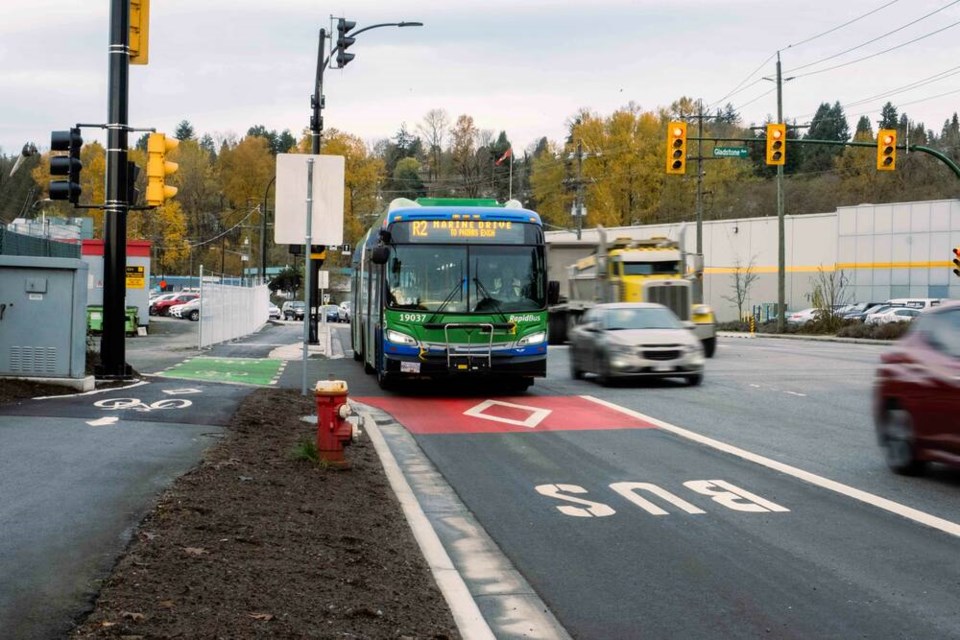The next North Shore RapidBus to Metrotown will be arriving in about two years.
Following an influx of cash from the province and approval by TransLink’s board and the Mayors’ Council, the latest investment plan from the transit agency will see the existing R2 Park Royal to Phibbs Exchange express bus extended to Burnaby’s busiest SkyTrain hub in 2027.
Also included in the announcement is funding for the planning work that will lead to the eventual launch of the North Shore Bus Rapid Transit line, which is expected to offer a higher level of service with dedicated lanes and priority signals at controlled intersections, as well as more comfortable rides and stations.
In the more near-term, TransLink will add all-day bus service to the 231 route, which connects the Harbourside neighbourhood with Lonsdale Quay. The run currently only operates from rush hour to rush hour.
Elsewhere in the system, there will be a five per cent increase in overall bus service targeted mainly for routes that experience the most overcrowding.
To cover the cost of the expansions announced this week, fares will be climbing by 5 per cent, or about 14 cents per trip, with two-per cent increases expected annually starting in 2027. The amount TransLink draws from property taxes will go up by $20 per year for a typical homeowner, and the amount the region charges in parking taxes is expected to climb by about 40 cents for a $10 parking fee.
The province is also contributing a $312-million operating grant that should keep the transit authority afloat until a “new funding source” can be identified and approved by the legislature.
At a joint meeting with TransLink’s board and the mayors Wednesday, Michelle Scarr, director of operations and strategy for Movement, a lobby group representing transit riders, specifically praised the extension of the R2. Scarr, a Burnaby resident, said she learned the hard way about taking transit to and from the North Shore when she was working a job here.
“Taking transit there was a long journey with a number of transfers, and I would often end up calling my dad to pick me up, or spending more than my hourly earnings on an EVO to get home, because the bus journey would have just been too long and it was too late,” she said. “The R2 extension will truly improve access for workers and for students, and I’m so thankful that it’s part of the plan."
The R2 extension has long been on the wish list of the North Vancouver Chamber, which sent a letter in support of the investment plan.
“Congestion on the North Shore is the top issue choking our economy and preventing a workforce from across Metro Vancouver from accessing family-supporting jobs on the North Shore,” chamber CEO Patrick Stafford Smith wrote. “In our view, the R2 RapidBus extension is a critical project that will significantly improve connectivity.”
TransLink has been warning of ongoing structural deficit that, without outside help, would result in as much as a 50 per cent reduction in transit service.
Under the latest investment plan, there is no risk for short-term cuts, and the longer-term deficit has been reduced by half.
But TransLink Mayors Council chair and Port Coquitlam Mayor Brad West stressed that, without a truly sustainable funding model, the fast-growing region’s transit system will always be in a precarious spot.
“We’ve talked about this for years and years, about the need for a new funding model for transit that reduces the reliance on fares and property taxes and is right-sized to deliver the service that this region requires,” he said. “We have to be bold and courageous and move quickly in this area if we want to avoid the repetitive nature of every two or three years having a panic and trying to come to a Band-Aid agreement.”
West also called on the province and feds to show up with capital funding for new projects, adding that “noted left-wing Premier Doug Ford” provides twice the capital funding per capita to transit in the GTA than David Eby’s government does in Metro Vancouver.
[email protected]
twitter.com/brentrichter
brentrichter.bsky.social
Want to stay updated on North Vancouver and West Vancouver news? Sign up for our free daily newsletter.



